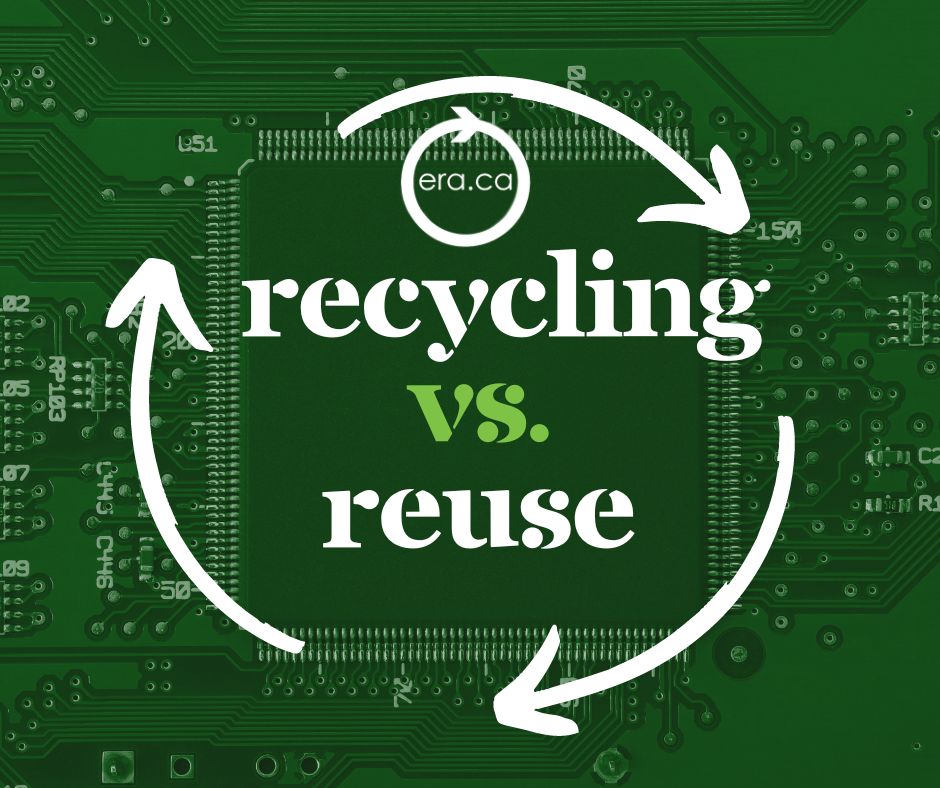In our rapidly evolving digital age, electronics play an indispensable role in our daily lives. From smartphones to laptops, our reliance on these devices is ever-growing. However, with this technological advancement comes the challenge of managing electronic waste sustainably. The Electronic Recycling Association (ERA) stands at the forefront of this challenge, advocating for the reuse of electronics as a key pillar in fostering a circular economy and mitigating environmental impact.
Understanding the Difference
Recycling: Recycling involves the process of breaking down electronic devices into raw materials, which can then be used to manufacture new products. While recycling reduces the need for virgin materials and diverts electronic waste from landfills, it often requires significant energy and resources.
Reuse: Reuse, on the other hand, emphasizes extending the lifespan of electronic devices by refurbishing them for secondary use. This approach not only conserves resources but also reduces the environmental footprint associated with manufacturing new electronics. Reuse embodies the principles of the circular economy, where products are kept in circulation for as long as possible through repair, refurbishment, and redistribution.
Environmental Benefits
- Resource Conservation: By extending the life of electronic devices through reuse, we minimize the demand for raw materials and energy required for manufacturing new products. This conserves precious resources such as metals, plastics, and rare earth elements, reducing the environmental strain associated with extraction and processing.
- Waste Reduction: Electronics recycling often involves dismantling devices into components, some of which may not be recyclable or may require specialized processes. Reuse circumvents this issue by keeping devices intact and functional, thereby reducing the volume of electronic waste destined for landfills or incineration.
- Energy Savings: The energy expended in recycling electronic devices is significantly higher than that required for refurbishment and reuse. By opting for reuse, we not only reduce energy consumption but also mitigate greenhouse gas emissions associated with the manufacturing and transportation of new electronics.
Promoting a Circular Economy
A circular economy aims to decouple economic growth from resource consumption by promoting sustainable production and consumption patterns. Reusing electronics aligns with this vision by prolonging product lifecycles and minimizing waste generation. It fosters a more resilient and resource-efficient economy where products are valued for their longevity and utility rather than their disposability.
The Role of the Electronic Recycling Association (ERA)
The Electronic Recycling Association (ERA) exemplifies the commitment to electronic reuse through its innovative programs and partnerships. ERA focuses on refurbishing and redistributing donated electronics to charities, non-profits, and individuals in need, thereby extending the lifespan of these devices and maximizing their societal impact.
Key Initiatives:
- Donation Programs: ERA facilitates the donation of used electronics to organizations and individuals who can benefit from them. By redirecting electronic devices from landfills to those in need, ERA promotes equitable access to technology while reducing electronic waste.
- E-Waste Management: ERA provides comprehensive e-waste pick-up services for companies, ensuring proper disposal and recycling of electronic devices. Additionally, ERA prioritizes data security by securely wiping and destroying data from donated electronics, safeguarding sensitive information and protecting privacy.
- Community Engagement: ERA actively engages with communities to raise awareness about the importance of electronic reuse and responsible e-waste management. Through educational initiatives and outreach programs, ERA empowers individuals and organizations to make sustainable choices regarding their electronic devices.

In the face of mounting environmental challenges, the imperative to adopt sustainable practices in electronic waste management has never been greater. By prioritizing reuse over recycling, we can minimize environmental impact, conserve resources, and promote a circular economy built on principles of sustainability and resilience. Organizations like the Electronic Recycling Association play a pivotal role in advancing this vision, demonstrating that by working together, we can create a more sustainable future for generations to come.


